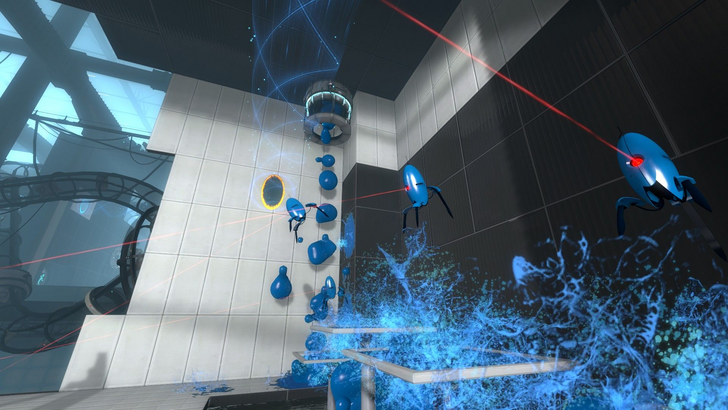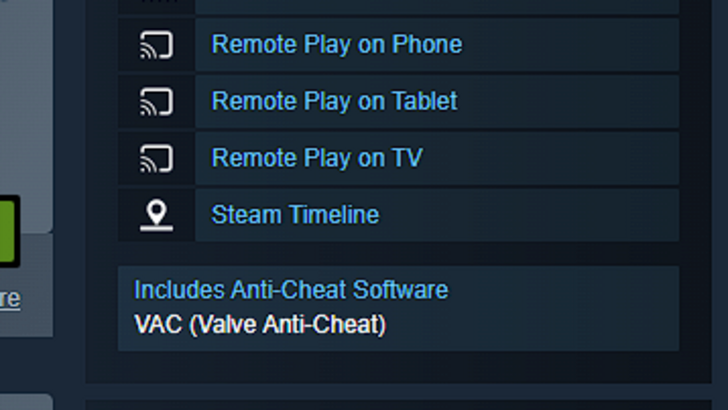Steam's New Anti-Cheat Disclosure Feature Sparks Debate
 Steam is mandating that developers declare whether their games utilize kernel-mode anti-cheat, a system that has generated significant controversy. This article explores the implications of Steam's recent platform update and the ongoing debate surrounding kernel-mode anti-cheat technology.
Steam is mandating that developers declare whether their games utilize kernel-mode anti-cheat, a system that has generated significant controversy. This article explores the implications of Steam's recent platform update and the ongoing debate surrounding kernel-mode anti-cheat technology.
Steam Introduces Anti-Cheat Transparency Tool
 Valve's recent Steam News Hub announcement details a new developer tool for disclosing in-game anti-cheat systems. Accessible via the Steamworks API's "Edit Store Page" section, this feature allows developers to specify their game's use of anti-cheat software. While disclosure for non-kernel-based systems remains optional, kernel-mode anti-cheat implementation is now mandatory, a move likely driven by player concerns regarding privacy and system intrusion.
Valve's recent Steam News Hub announcement details a new developer tool for disclosing in-game anti-cheat systems. Accessible via the Steamworks API's "Edit Store Page" section, this feature allows developers to specify their game's use of anti-cheat software. While disclosure for non-kernel-based systems remains optional, kernel-mode anti-cheat implementation is now mandatory, a move likely driven by player concerns regarding privacy and system intrusion.
The Kernel-Mode Anti-Cheat Controversy
 Kernel-mode anti-cheat, which directly examines processes on a player's system to detect malicious activity, has been a source of contention. Unlike traditional methods that analyze in-game behavior, kernel-mode solutions access low-level system data, raising concerns about potential performance impacts, security vulnerabilities, and privacy risks.
Kernel-mode anti-cheat, which directly examines processes on a player's system to detect malicious activity, has been a source of contention. Unlike traditional methods that analyze in-game behavior, kernel-mode solutions access low-level system data, raising concerns about potential performance impacts, security vulnerabilities, and privacy risks.
Responding to Developer and Player Feedback
 Valve's update reflects feedback from both developers seeking clearer communication channels and players demanding greater transparency regarding anti-cheat mechanisms and software installations. Valve's official Steamworks blog post emphasizes this dual objective, highlighting the need for both developer clarity and enhanced player information.
Valve's update reflects feedback from both developers seeking clearer communication channels and players demanding greater transparency regarding anti-cheat mechanisms and software installations. Valve's official Steamworks blog post emphasizes this dual objective, highlighting the need for both developer clarity and enhanced player information.
Mixed Community Response to the Update
 Launched October 31st, 2024, at 3:09 a.m. CST, the update is live, with games like Counter-Strike 2 already displaying their use of Valve Anti-Cheat (VAC). While many applaud Valve's "pro-consumer" approach, criticism remains. Some users have pointed out minor issues like grammatical inconsistencies and awkward wording.
Launched October 31st, 2024, at 3:09 a.m. CST, the update is live, with games like Counter-Strike 2 already displaying their use of Valve Anti-Cheat (VAC). While many applaud Valve's "pro-consumer" approach, criticism remains. Some users have pointed out minor issues like grammatical inconsistencies and awkward wording.
Ongoing Questions and Concerns
 Further questions regarding practical implementation, such as language translation and defining "client-side kernel-mode" anti-cheat, have been raised. The debate surrounding PunkBuster and the inherent invasiveness of kernel-mode anti-cheat also continues. Despite this, Valve's commitment to consumer protection is evident, as demonstrated by their transparency concerning recent California consumer protection legislation. The long-term impact on community apprehension towards kernel-mode anti-cheat remains uncertain.
Further questions regarding practical implementation, such as language translation and defining "client-side kernel-mode" anti-cheat, have been raised. The debate surrounding PunkBuster and the inherent invasiveness of kernel-mode anti-cheat also continues. Despite this, Valve's commitment to consumer protection is evident, as demonstrated by their transparency concerning recent California consumer protection legislation. The long-term impact on community apprehension towards kernel-mode anti-cheat remains uncertain.

 Steam is mandating that developers declare whether their games utilize kernel-mode anti-cheat, a system that has generated significant controversy. This article explores the implications of Steam's recent platform update and the ongoing debate surrounding kernel-mode anti-cheat technology.
Steam is mandating that developers declare whether their games utilize kernel-mode anti-cheat, a system that has generated significant controversy. This article explores the implications of Steam's recent platform update and the ongoing debate surrounding kernel-mode anti-cheat technology. Valve's recent Steam News Hub announcement details a new developer tool for disclosing in-game anti-cheat systems. Accessible via the Steamworks API's "Edit Store Page" section, this feature allows developers to specify their game's use of anti-cheat software. While disclosure for non-kernel-based systems remains optional, kernel-mode anti-cheat implementation is now mandatory, a move likely driven by player concerns regarding privacy and system intrusion.
Valve's recent Steam News Hub announcement details a new developer tool for disclosing in-game anti-cheat systems. Accessible via the Steamworks API's "Edit Store Page" section, this feature allows developers to specify their game's use of anti-cheat software. While disclosure for non-kernel-based systems remains optional, kernel-mode anti-cheat implementation is now mandatory, a move likely driven by player concerns regarding privacy and system intrusion. Kernel-mode anti-cheat, which directly examines processes on a player's system to detect malicious activity, has been a source of contention. Unlike traditional methods that analyze in-game behavior, kernel-mode solutions access low-level system data, raising concerns about potential performance impacts, security vulnerabilities, and privacy risks.
Kernel-mode anti-cheat, which directly examines processes on a player's system to detect malicious activity, has been a source of contention. Unlike traditional methods that analyze in-game behavior, kernel-mode solutions access low-level system data, raising concerns about potential performance impacts, security vulnerabilities, and privacy risks. Valve's update reflects feedback from both developers seeking clearer communication channels and players demanding greater transparency regarding anti-cheat mechanisms and software installations. Valve's official Steamworks blog post emphasizes this dual objective, highlighting the need for both developer clarity and enhanced player information.
Valve's update reflects feedback from both developers seeking clearer communication channels and players demanding greater transparency regarding anti-cheat mechanisms and software installations. Valve's official Steamworks blog post emphasizes this dual objective, highlighting the need for both developer clarity and enhanced player information. Launched October 31st, 2024, at 3:09 a.m. CST, the update is live, with games like Counter-Strike 2 already displaying their use of Valve Anti-Cheat (VAC). While many applaud Valve's "pro-consumer" approach, criticism remains. Some users have pointed out minor issues like grammatical inconsistencies and awkward wording.
Launched October 31st, 2024, at 3:09 a.m. CST, the update is live, with games like Counter-Strike 2 already displaying their use of Valve Anti-Cheat (VAC). While many applaud Valve's "pro-consumer" approach, criticism remains. Some users have pointed out minor issues like grammatical inconsistencies and awkward wording. Further questions regarding practical implementation, such as language translation and defining "client-side kernel-mode" anti-cheat, have been raised. The debate surrounding PunkBuster and the inherent invasiveness of kernel-mode anti-cheat also continues. Despite this, Valve's commitment to consumer protection is evident, as demonstrated by their transparency concerning recent California consumer protection legislation. The long-term impact on community apprehension towards kernel-mode anti-cheat remains uncertain.
Further questions regarding practical implementation, such as language translation and defining "client-side kernel-mode" anti-cheat, have been raised. The debate surrounding PunkBuster and the inherent invasiveness of kernel-mode anti-cheat also continues. Despite this, Valve's commitment to consumer protection is evident, as demonstrated by their transparency concerning recent California consumer protection legislation. The long-term impact on community apprehension towards kernel-mode anti-cheat remains uncertain. LATEST ARTICLES
LATEST ARTICLES 












